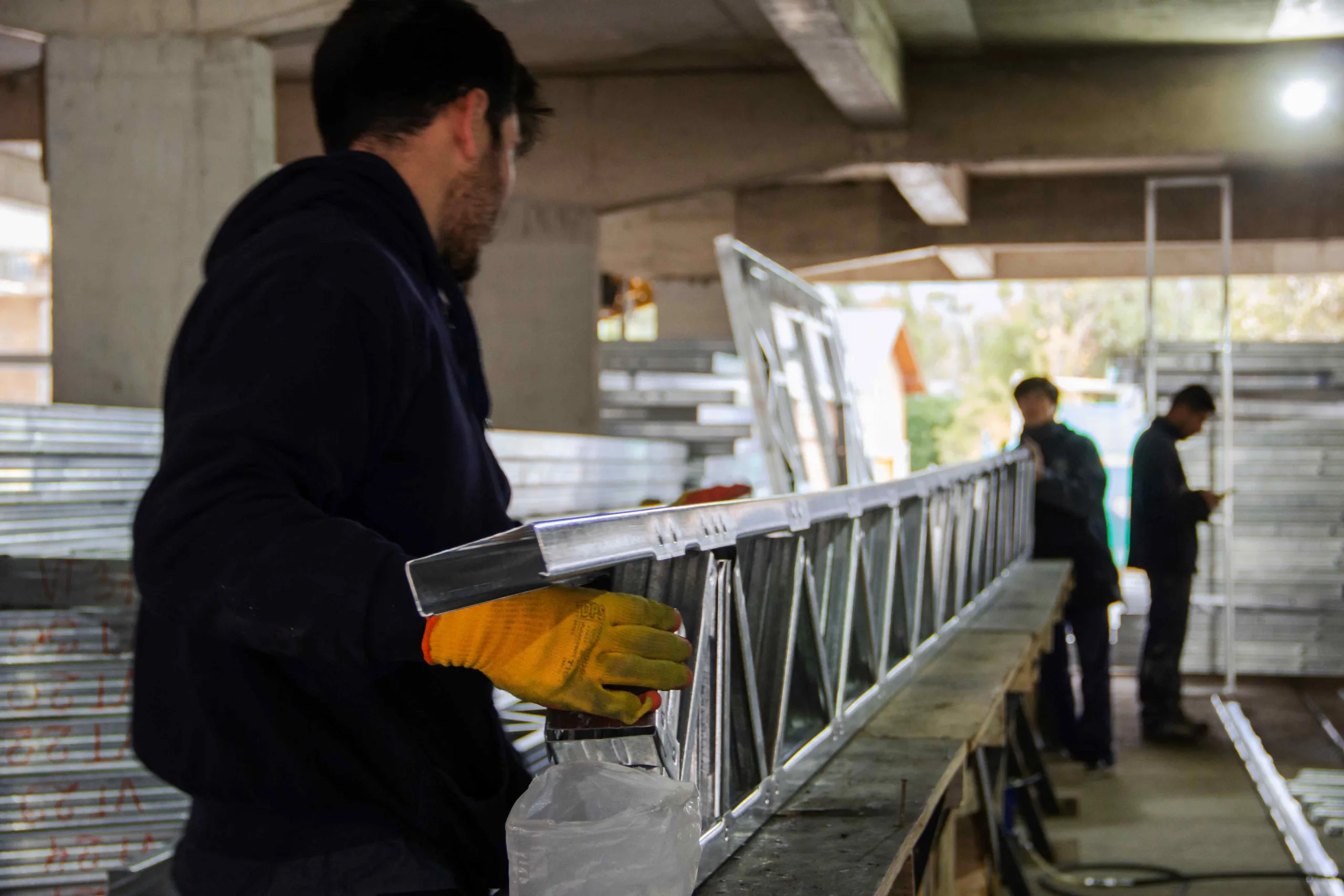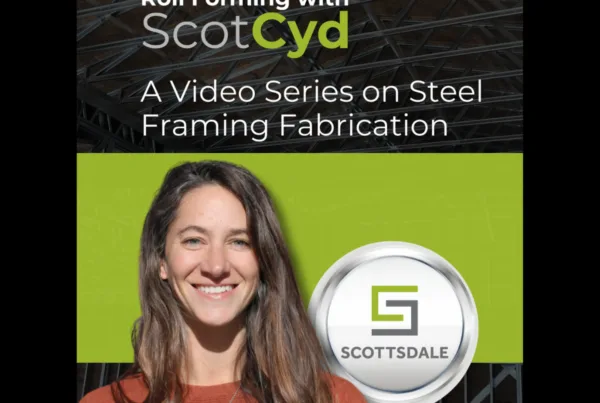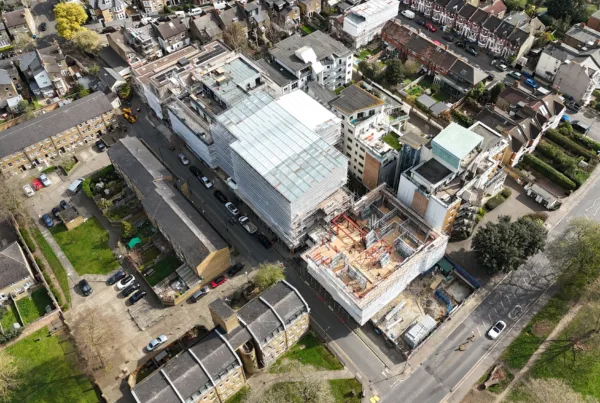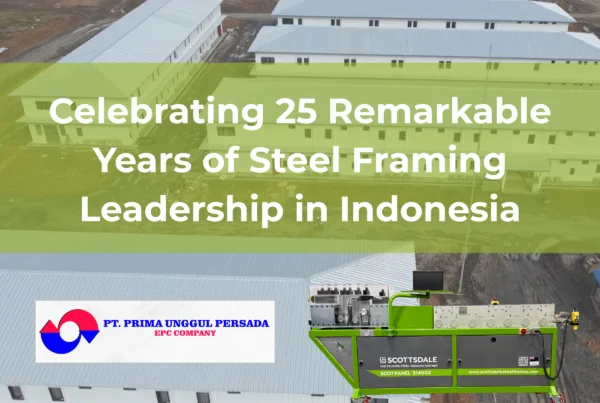Cold formed metal framing has revolutionized the construction industry, becoming the preferred choice for developers seeking durability, efficiency, and cost-effectiveness.
From student dormitories to assisted living facilities and hotels, this innovative building method is transforming how we construct modern buildings.
What is Cold Formed Metal Framing?
Cold formed metal framing refers to structural members made from high-quality sheet steel that are shaped into C-sections and other configurations through a roll-forming process.
Unlike hot-rolled steel, no heat is required during formation, hence the term “cold-formed.” This manufacturing process creates lightweight yet incredibly strong framing components available in various thicknesses to meet both structural and non-structural applications.
The technology has evolved significantly, with advanced panelized systems now making cold form metal framing suitable for structural applications in mid-rise and multi-housing buildings, not just interior partition walls.
Key Advantages of Cold Formed Metal Framing
Cold formed metal framing represents a revolutionary advancement in construction technology, delivering unmatched durability, sustainability, and safety compared to traditional building materials. This engineered steel solution combines the structural integrity needed for modern construction with environmental responsibility and long-term cost effectiveness.
From its superior resistance to natural disasters and fire to its complete recyclability and dimensional stability, cold formed metal framing addresses the key challenges facing today’s builders while providing lasting value for property owners. Let’s dig into some of the key advantages of steel.
Superior Material Properties
Cold formed metal framing offers exceptional performance characteristics that set it apart from traditional building materials:
- Dimensional Stability: Won’t shrink, split, or warp over time
- Moisture Resistance: Doesn’t absorb water or suffer water damage
- Fire Safety: Completely non-combustible material
- Pest Protection: Immune to termites, mold, and mildew
- Consistent Quality: Uniformly manufactured with minimal waste
Environmental Sustainability
Modern construction demands environmentally responsible materials, and cold formed metal framing delivers:
- Resource Efficiency: The long-lasting nature means structures require minimal maintenance, repairs, or reconstruction over centuries, reducing waste and carbon emissions.
- Transportation Benefits: Its lightweight properties reduce shipping emissions and require fewer resources during
construction lifting operations. - Complete Recyclability: Contains a minimum 25% recycled content and is 100% recyclable at end-of-life, with no volatile organic compound emissions.

Natural Disaster Resistance
Cold formed metal framing provides superior protection against various environmental threats:
- Seismic Safety: Excellent ductility and strength make it ideal for earthquake-prone regions, reducing structural damage and protecting occupants.
- Fire Protection: Non-combustible properties prevent fire spread and can reduce insurance premiums for builders’ risk and construction coverage.
- Water Damage Prevention: Unlike wood framing, it won’t retain moisture or suffer flood damage, making it perfect for coastal areas prone to hurricanes.
Cold Formed Metal Framing Construction and Installation Benefits
Cold formed metal framing transforms the construction experience by significantly reducing installation time and complexity while maintaining superior structural performance. The system’s lightweight design and pre-engineered components enable faster assembly with fewer workers, while pre-punched panels eliminate time-consuming field drilling for utilities.

With minimal additional tool requirements and a straightforward learning curve for experienced crews, contractors can quickly transition to this advanced framing method while benefiting from improved jobsite efficiency, reduced labor costs, and accelerated project timelines.
Jobsite Efficiency
Cold formed metal framing streamlines the construction process through several key advantages:
- Lightweight Handling: Easy to ship, handle, and assemble on-site
- Efficient Spacing: Superior strength allows 24″ center installation versus traditional 16″ centers, requiring fewer studs
- Pre-manufactured Options: Factory-built panels and trusses minimize skilled labor requirements
- Pre-punched Systems: Panels include pre-designed holes for rapid mechanical, electrical, and plumbing installation
Training and Tool Requirements
Transitioning to cold form metal framing is straightforward for experienced construction crews. The basic tool set includes:
- Adjustable-torque screw gun with appropriate bits
- Hand seamer for positioning and bending
- Chop saw and pneumatic pin-nailer
- Aviation snips and swivel-head electric shear
- Clamps and magnetic level
Most experienced framers can quickly adapt their existing skills to work with steel C-section studs, formed steel tracks, and specialized fasteners.
Cold Formed Metal Framing Cost Considerations
When evaluating cold formed metal framing cost, it’s essential to consider both initial investment and long-term value rather than focusing solely on upfront material prices. While material costs may vary compared to traditional framing, the reduced labor requirements and significantly faster installation times often offset any higher initial expenses.

The true financial advantage becomes clear over time through substantial long-term savings, including reduced insurance premiums due to superior fire resistance, minimal maintenance requirements over decades of use, and elimination of replacement costs from pest damage or moisture-related issues.
Long-Term Savings with Cold Formed Metal Framing
- Reduced insurance premiums due to fire resistance
- Minimal maintenance requirements over decades
- No replacement costs from pest damage or moisture issues
- Potential energy savings from consistent thermal performance
Project Efficiency: Fewer studs required, faster installation, and reduced waste contribute to overall project cost savings.
Additionally, the consistent thermal performance can deliver ongoing energy savings throughout the building’s lifecycle.
Project efficiency factors further enhance cost-effectiveness: the system requires fewer studs due to superior strength, enables faster installation with smaller crews, and generates less construction waste, all contributing to meaningful overall project cost savings that make cold formed metal framing a smart financial choice for forward-thinking builders.
Ask us about our comprehensive business calculators, enabling a detailed assessment of CAPEX, OPEX and profitability on individual project basis with Scottsdale’s rollforming technology.
Is Cold Formed Metal Framing Right for Your Project?
Consider these factors when determining if this construction method suits your needs:
Project Requirements
- Building Codes: Check local requirements. Some projects may mandate steel framing
- Safety Needs: High-durability requirements favor cold formed metal framing
- Design Compatibility: Ensure the framing system meets your architectural plans
- Project Scope: Decide between complete steel framing or hybrid approaches
Budget Analysis
Evaluate the total cost of ownership, not just initial expenses. Factor in:
- Material and installation costs
- Insurance premium reductions
- Long-term maintenance savings
- Potential resale value improvements

Professional Consultation
If you’re uncertain about implementation, consult with cold formed metal framing experts. Professional guidance ensures optimal material selection and proper installation techniques for your specific project requirements.
Industry leaders like Scottsdale Construction Systems offer comprehensive consultation services and support to help you navigate the transition to cold formed metal framing.
With our team of experienced engineers and steel framing specialists available 24/7, Scottsdale provides expert guidance on everything from initial project assessment and design optimization to equipment selection and installation support. Our integrated approach combines advanced roll forming technology, powerful design software, and extensive industry knowledge to ensure your project success from concept to completion.
Industry Standards and Acceptance
Cold formed metal framing benefits from comprehensive industry support through the American Iron and Steel Institute’s North American Standards, which are incorporated into International Building Codes. These freely available standards provide builders and designers with detailed provisions for steel framing implementation.

The widespread adoption of these standards has made cold formed metal framing a mainstream construction method with proven performance across diverse project types and geographic regions.
Conclusion
Cold formed metal framing represents the future of efficient, sustainable construction. Its combination of strength, durability, environmental benefits, and cost-effectiveness makes it an ideal choice for modern building projects. Whether you’re planning a small residential project or a large commercial development, understanding what cold formed metal framing offers can help you make informed decisions that benefit both your budget and long-term building performance.
When you’re ready to implement cold formed metal framing in your next project, partnering with industry leaders makes all the difference.
The Scottsdale Advantage
Companies like Scottsdale Construction Systems, with over 70 years of progressive industry leadership and more than 16,000 roll forming systems supplied globally, offer the world-leading technology and comprehensive support needed to ensure project success.
From advanced roll forming machinery and integrated design software to 24/7 technical support and material supply solutions, working with established industry pioneers provides the confidence and capabilities to fully realize the benefits of cold formed metal framing technology.
Additional Resources
- Blog – How to Achieve Better Spans With Cold-Formed Steel Trusses
- Blog – Strengthening of Hat-Section Trusses Under Heavy Loads
- Blog – Enhancing C-Section Trusses for Heavy Load Applications
- Blog – Best Steel Framing Results with Advanced Roll Forming Technology
- Blog – Remarkable Results in Steel Framing with Roll Forming Technology
- Download – Cost Effectiveness Comparison of In-line C-Section and Hat-Section Cold-Formed Steel Trusses
- Video – Steel Framing Fabrication Process with Scotpanel and Scottruss Roll Forming Technology
- Video – Cold-Formed Steel Truss Design, Engineering, Fabrication & Site Erection
- Video – Scottsdale Steel Truss Fabrication
- Financial Services
To learn more about Scottsdale’s roll forming solutions, visit us at www.scottsdalesteelframes.com, call us at +1 (888) 406-2080, or email us at rollformers@scottsdalesteelframes.info.




